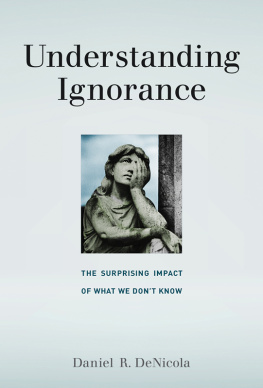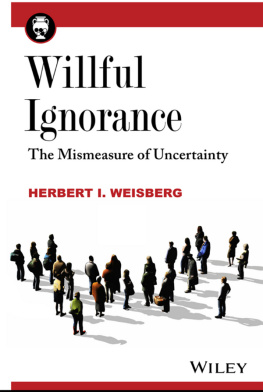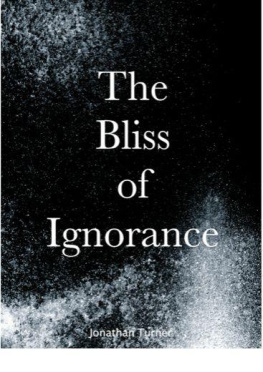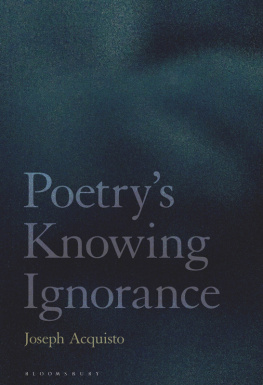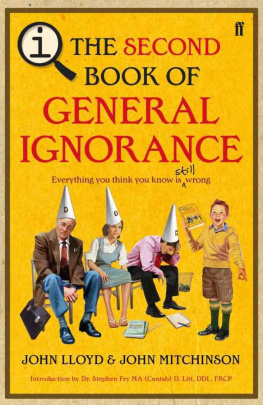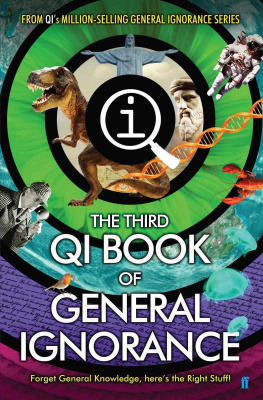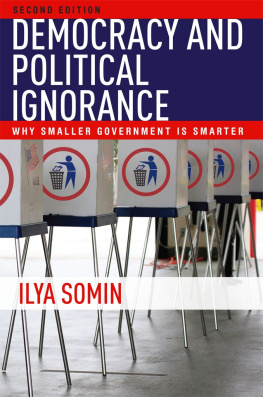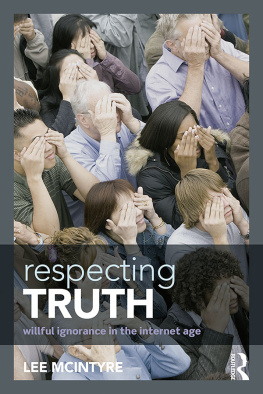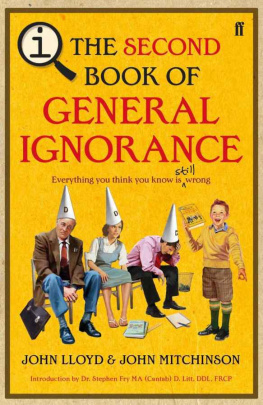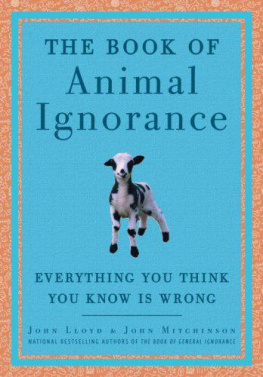
Understanding Ignorance
The Surprising Impact of What We Dont Know
Daniel R. DeNicola
The MIT Press
Cambridge, Massachusetts
London, England
2017 Massachusetts Institute of Technology
All rights reserved. No part of this book may be reproduced in any form by any electronic or mechanical means (including photocopying, recording, or information storage and retrieval) without permission in writing from the publisher.
This book was set in ITC Stone Sans Std and ITC Stone Serif Std by Toppan Best-set Premedia Limited. Printed and bound in the United States of America.
Library of Congress Cataloging-in-Publication Data
Names: DeNicola, Daniel R., author.
Title: Understanding ignorance : the surprising impact of what we dont know / Daniel R. DeNicola.
Description: Cambridge, MA : MIT Press, [2017] | Includes bibliographical references and index.
Identifiers: LCCN 2016053943 | ISBN 9780262036443 (hardcover : alk. paper)
eISBN 9780262341028
Subjects: LCSH: Ignorance (Theory of knowledge) | Knowledge, Theory of.
Classification: LCC BD221 .D46 2017 | DDC 153.4--dc23 LC record available at https://lccn.loc.gov/2016053943
ePub Version 1.0
For my teachers and my students, who have given me, in the interplay of knowing and not knowing, a joyful life
Preface
Over the years, I have occasionally taught a seminar for first-year students titled Secrets and Lies. During our discussions about the ethics of seeking, withholding, and revealing information, I became drawn to the epistemological issues, the ways in which we trade in knowing and not knowing within an epistemic community. Early thoughts about the multifaceted nature of ignorance coalesced in Intimations of Ignorance, a talk given to Gettysburgs Phi Beta Kappa chapter in 2009. Later that year, I devoted a Senior Seminar to an exploration of the topic. I had intended to discuss ignorance in the book that became Learning to Flourish (2012), but soon realized it was too large, complex, and rich for anything but a peripheral inclusion. Ignorance required a front-and-center discussion. It took until 2015, and a sabbatical granted by Gettysburg College (for which I am thankful), before a first draft was completed.
Many of my intellectual debts are of course reflected in the bibliography, but some of the most significant are not. My home department, an exemplary epistemic community, has continually offered encouragement: I am grateful to my colleaguesSteve Gimbel, Gary Mullen, Lisa Portmess, Kerry Walters, Vernon Cisney, Paul Carrick, and Gary Cioccofor their engagement with my preoccupation and for their thoughtful responses. At Lancaster University (UK), where I was a visiting scholar in 2012, I had numerous helpful conversations with faculty members and doctoral students. All were first rate, but I owe special thanks to Neil Manson for a memorable lunchtime discussion of epistemic restraint. I benefited from interchanges with many at both institutions who attended my research colloquia. There are also people with whom I had a quite brief conversation that proved significantthough they would not have known it then. I recalled with new resonance nearly forgotten interchanges about ignorance with mentors Israel Scheffler and John Rawls; though both are now gone, they have my gratitude. I thank Catherine Elgin and Amelie Rorty for their quick enthusiasm for my project; Timothy Williamson for his immediate, astute response to an out-of-the-blue email query; and Jennifer Logue and Tyson Lewis for sidebar discussions inspired by their conference papers. The anonymous reviewers engaged by the MIT Press improved this bookeven when they differed. One later agreed to divulge his identity to give me access to his many perceptive annotations to the text: Michael McFall, I thank you. MITs editorial staff is excellent, especially Chris Eyer and Judith Feldmann, and the book simply would not have appeared without the steady support of Senior Acquisitions Editor Philip Laughlin.
It is my wonderfully good fortune to have, every day and always, the loving support of my wife, Sunni. I have regularly called upon her indulgence as a listener; her fine, editorial sense of the readers needs; and her tolerance of precarious piles of books. Grazie, luce del sole della mia vita.
An acknowledgment: the epigraph for part 2 is from The Outcry, a poem by Abu al-Qasim al-Shabbi, as translated by Atef Ashaer, and is reprinted here with permission of Taylor & Francis. It appears on page 396 of Ashaers article, Poetry and the Arab Spring, in the Routledge Handbook of the Arab Spring: Rethinking Democratization, edited by Larbi Sadiki (New York: Routledge, 2014), 392407.
Four decisions shaped the writing of this book. I chose: (1) to attempt a comprehensive study that would examine many facets of ignorance; (2) to integrate perspectives drawn from contemporary studies in many disciplines; (3) to structure the discussion using four spatial metaphors for ignoranceplace, boundary, limit, and horizon; and (4) to write a rather nontechnical, occasionally broad-brush text. (Even so, I am likely to try the patience of some readers.) The public importance and interdisciplinary nature of ignorance have led me to reach for a readership beyond epistemologists, beyond philosophersbeyond, but not without, I hope, for the issues and conclusions are also of philosophical relevance.
This book is about ignorance, but it is sure to exemplify it as well. If I knew the where or how, I would have made it better. But ignorance is both a charge and an excuse. To the former, I can only offer the latterand the hope that it exemplifies understanding, as well.
Daniel R. DeNicola
Gettysburg, 2017
I Images of Ignorance
If I were given carte blanche to write about any topic I could, it would be about how much our ignorance, in general, shapes our lives in ways we do not know about. Put simply, people tend to do what they know and fail to do that which they have no conception of. In that way, ignorance profoundly channels the course we take in life.
David Dunning
1 The Impact of Ignorance
Knowledge is a big subject. Ignorance is bigger. And it is more interesting.
Stuart Firestein
Ignorance abounds. It is ubiquitous, and to doubt that fact is to risk becoming another case in point. In the familiar metaphor, our ignorance (whether individual or collective) is a vast, fathomless sea; our knowledge but a small, insecure island. Even the shoreline is uncertain: both the history of the human race and psychological research suggest that we know even less than we think we do. Indeed, our ignorance is extensive beyond our reckoning.
Ignorance endures. It persists. Oh, we may be lulled by its apparent fragility, as in the oft-quoted Oscar Wilde quip: Ignorance is like a delicate exotic fruit; touch it and the bloom is gone. It wilts and vanishes at the merest touch of learning. But, its evanescence notwithstanding, ignorance is not endangered. Its blooms may be delicate, but the species is as hardy as kudzu. Despite the spread of universal, compulsory education; despite new tools for learning and great advances in knowledge; despite breathtaking increases in our ability to store, access, and share a superabundance of informationignorance flourishes.
One might wonder why this is so. Does ignorance thrive because, well, we are so ignorant? Might we simply lack enough knowledgeor the right knowledgeto roll back the tide of ignorance? Perhaps its persistence is a reflection of our fallen state, a shameful weakness of will, or a sin of epistemic laziness. Is ignorance like the dirtiness of the world, which stubbornly resists our most industrious efforts to cleanse it thoroughly, and which will be with us eternally? Or, worse, is it possible that more learning actually increases our ignorancelike daubing a stain that only spreads further with every attempt to eradicate it? The idea has become clich: the more we know, the more we know we dont know. Could we really be the creators of our own ignorance? Such ruminations, like all questionings, express a desire to understand, that, ironically, can arise only within and from ignorance. Ignorance is both the source and the target of such questions.
Next page
